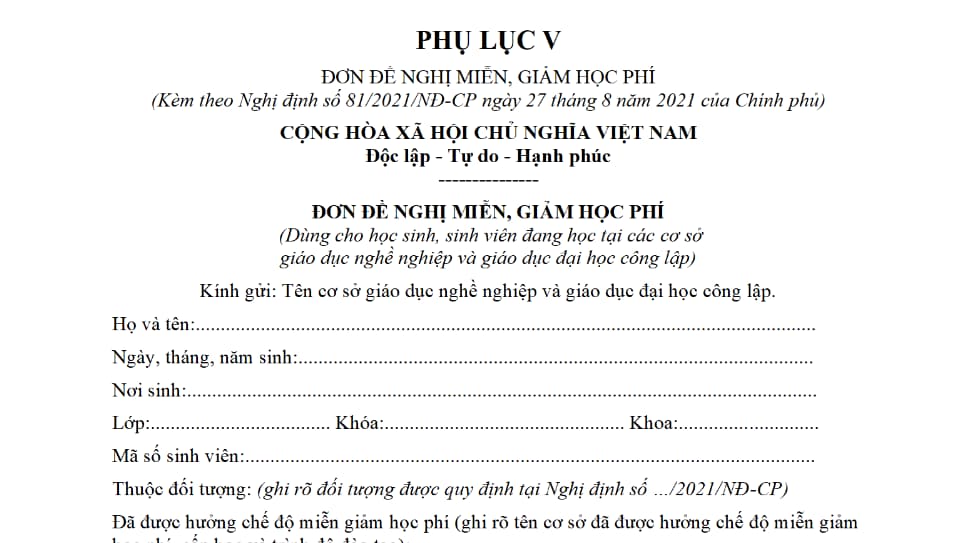Vietnam: Application form for tuition reduction for students of intermediate-level schools
Application form for tuition reduction for students of collleges
The application form for tuition reduction for students of collleges is the form in Appendix 5 issued together with Decree 81/2021/ND-CP of Vietnam's Government.

Download the application form for tuition reduction for students of collleges here

Application form for tuition reduction for students of collleges (Image from Internet)
Which majors and specializations in collleges will have a 70 percent tuition fee reduction?
According to Clause 1, Article 16 of Decree 81/2021/ND-CP, eligibility for a tuition reduction of 70% includes:
Eligibility for tuition reduction and tuition financing
1. Eligibility for a tuition reduction of 70% includes:
a) Students pursuing traditional arts and specific majors in public, private vocational education institutions and higher education institutions providing cultural - artistic training;
b) Students pursuing traditional art forms or taxing, toxic, or hazardous occupations in case of vocational education as per lists of taxing, toxic, or hazardous occupations regulated by Ministry of Labor – War Invalids and Social Affairs;
c) Kindergarten children and students who are ethnic minorities (other than very minor ethnic minorities) in hamlets with particular difficulties, communes in category III areas, ethnic regions and mountainous regions, communes with difficulties in coastal regions and islands according to regulations of competent authority.
2. Eligibility for a tuition reduction of 50% includes:
a) Kindergarten children and students who are children of officials, public officials, or workers whose parent suffers from occupational accidents or diseases and receive regular benefits;
b) Preschool students, students of formal education, learners in continuous education facilities pursuing formal education program whose parent or parents or grandparents (if living with grandparents) are near-poor households according to regulations of Prime Minister.
3. Eligibility for tuition financing: Primary education students in private education institutions in areas with insufficient number of public education institutions shall receive financing for tuition.
Therefore, colllege students in the following majors and specializations will receive a 70 percent tuition fee reduction. To be specific:
- Traditional and special arts: instrumentalists of traditional theater, traditional Hue musicians, Southern Vietnam folk opera instrumentalists, stage actor-singers, folk performance artists, ca tru art, bai choi art, traditional instrumental performance;
- Majors and specializations in royal court music, cheo, tuong, cai luong, dance, circus; certain arduous, toxic, and dangerous vocations as per the list determined by the Ministry of Labor - Invalids and Social Affairs;
* In the case of college students who are ethnic minorities (excluding a very small number of ethnic minorities) in exceptionally difficult villages or hamlets, Zone III communes in ethnic and mountainous regions, especially difficult communes of coastal sandy areas and islands, a 70 percent tuition fee reduction is applicable regardless of the major or specialization.
What are the principles of determining tuition for public colleges?
According to Clause 2, Article 8 of Decree 81/2021/ND-CP, principles of determining tuition for public vocational education institutions are specified as follows:
Principles of determining tuition
1. For preschools and public formal education institutions.
Tuition shall be developed in a manner that is distributed between the government and the learners and satisfactory to socio-economic conditions of each residential areas, contribution capacity of the general public, growth rate of consumer price index, annual economic growth rate, and roadmap for calculating fees for services in education and training sectors as per the law while guaranteeing education quality.
2. For public vocational education institutions.
a) Public vocational education institutions that have guaranteed recurrent expenditure partially and public vocational education institutions that have recurrent expenditure guaranteed by the government (hereinafter referred to as “public vocational education institutions that have not guaranteed recurrent expenditure entirely”) shall determine tuition without exceeding the top limit under Point a Clause 1 and Point a Clause 2 Article 10 hereof;
b) Public vocational education institutions that have guaranteed recurrent expenditure entirely shall determine tuition for each major based on variables compared to the top limit applicable to vocational education institutions that have not guaranteed recurrent expenditure entirely according to Clause 2 Article 10 hereof;
c) Public vocational education institutions that have guaranteed recurrent expenditure and investment expenditure entirely and are allowed to determine tuition must make sure to cover costs and accumulate according to Law on Vocational Education and other relevant documents.
...
Therefore, the principles for determining the tuition fees of public colleges are as follows:
- For colleges not self-financing recurring expenditures: determine the tuition fee not exceeding the tuition fee ceiling at Point a, Clause 1, and Point a, Clause 2, Article 10 of Decree 81/2021/ND-CP (amended by Article 1 Decree 97/2023/ND-CP);
- For colleges self-financing recurring expenditures: determine tuition fees for each major based on adjustment coefficients compared to the tuition fee ceiling stipulated for public vocational education institutions not self-financing recurring expenditures under Clause 2, Article 10 of Decree 81/2021/ND-CP (amended by Article 1 Decree 97/2023/ND-CP);
- Public universities self-financing both recurring and investment expenditures determine tuition fees ensuring cost coverage and accumulation as per the Law on Vocational Education 2014 and related documents.

